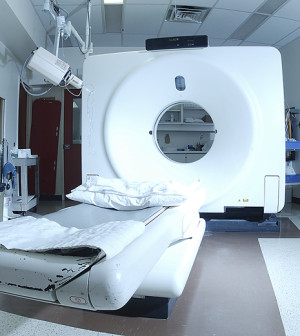- Could Your Grocery Store Meat Be Causing Recurring UTIs?
- Are You Making This Expensive Thermostat Error This Winter?
- Recognizing the Signs of Hypothyroidism
- 10 Strategies to Overcome Insomnia
- Could Artificial Sweeteners Be Aging the Brain Faster?
- Techniques for Soothing Your Nervous System
- Does the Water in Your House Smell Funny? Here’s Why
- Can a Daily Dose of Apple Cider Vinegar Actually Aid Weight Loss?
- 6 Health Beverages That Can Actually Spike Your Blood Sugar
- Treatment Options for Social Anxiety Disorder
Excess Pre-Pregnancy Weight May Slightly Raise Baby’s Cerebral Palsy Risk

Some women who are overweight or obese before pregnancy may face a slight increased risk of having a baby with cerebral palsy, a new study suggests.
After reviewing data from two Nordic countries, researchers also found that the risk of cerebral palsy was elevated in infants whose mothers’ pre-pregnancy weight was in the upper-normal range.
But experts stressed that the overall risks of having a baby with cerebral palsy (CP) remain very small, even among women carrying excess weight.
“Even though an increased risk for overweight women of 60 percent seems high, the risk of having a baby with CP is still very low,” said study author Ingeborg Forthun, a doctoral student at University of Bergen in Norway.
It’s also important to note that this study only proved an association between mothers’ pre-pregnancy weight and CP, not a cause-and-effect relationship.
Cerebral palsy is a group of disorders affecting movement, balance and posture. It affects about 1 in 323 infants in the United States, according to the U.S. Centers for Disease Control and Prevention.
Cerebral palsy is caused by brain damage or abnormal brain development, affecting muscle control and sometimes creating vision and hearing problems, learning disabilities or seizures, the CDC says.
In the new research, Forthun and her team combed through data on nearly 189,000 children from national data in Norway and Denmark.
Women’s pre-pregnancy body mass index (BMI) was grouped into those who were underweight, lower-normal weight, upper-normal weight, overweight and obese. Body mass index is a rough estimate of a person’s body fat based on height and weight measurements.
A normal BMI is 18.5 to 24.9, according to the CDC. An overweight BMI is 25 to 29.9, and obese is a BMI of 30 or over. For someone who’s 5 feet, 9 inches tall a weight of 125 to 168 pounds is considered normal weight, 169 to 202 pounds is overweight, and 203 pounds and more is obese, the CDC says.
Within the two countries, 390 cases of cerebral palsy were documented. The study also found mothers in the upper-normal weight group had a 40 percent greater risk of having a baby with the disorder. Results were consistent when adjusted for occupation, age and smoking status.
Forthun and an American expert agreed that several factors related to being overweight may contribute to the higher risks of cerebral palsy. They include greater incidence of pregnancy-related diabetes and birth complications in women with higher BMIs.
“The increased risk may also be linked to obesity-induced inflammation in the fat tissue, although this has not yet been explored,” Forthun said.
Dr. Kelly Ruhstaller is a maternal-fetal medicine physician at the Delaware Center for Maternal and Fetal Medicine at Christiana Care Health System in Wilmington. She said many American women begin pregnancy already carrying too much weight.
“Women are starting pregnancy at higher BMIs than even 20 years ago,” said Ruhstaller.
She added that other research has shown that the majority of women gain more weight than recommended by the Institute of Medicine while pregnant, which ranges from 11 to 40 pounds depending on pre-pregnancy weight.
Ruhstaller said the new research “adds to the support for the argument that women contemplating pregnancy should really do everything they can to get themselves to a healthy weight, which can be a challenge. But, starting pregnancy at a healthy weight is associated with much better outcomes for baby and mother as well.”
Forthun echoed that sentiment. “In general, women who plan to get pregnant should try to reach a healthy weight and focus on eating healthy during pregnancy,” she said.
The study was published online Sept. 8 in the journal Pediatrics.
More information
Visit the U.S. Centers for Disease Control and Prevention for more on cerebral palsy.
Source: HealthDay
Copyright © 2026 HealthDay. All rights reserved.










